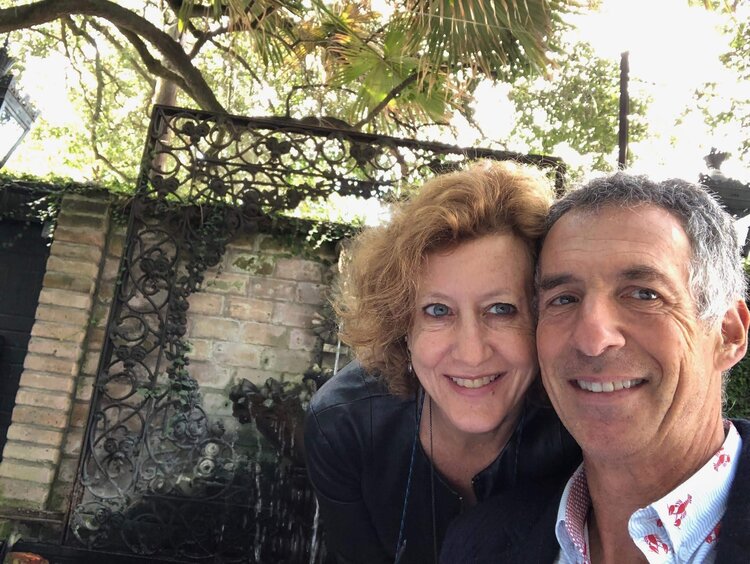Debbie Polishook is the former Group Chief Executive of Accenture Operations. After 35 years, she’s getting ready for retirement in Miami with her husband. Over the course of her long and successful career, she’s learned that time management is the key to success. “The 24 hours in a day is the most precious thing we have as humans,” she says. “As a leader, when everybody wants a piece of that 24 hours, you have to be incredibly clear about what your priorities are and how you’re going to spend that currency of time.”

Numbers: how much sleep do you need to function at your best?
I need at least 7 hours of real sleep, but I allow myself 8.5 to 9 hours of time in bed.
Has that changed over time?
I remember loving to sleep when I was in high school and college. In the morning, I would be able to sleep until noon or 1 in the afternoon with no problem. Now I can’t do that! I wake up at 6:30 and I’m ready to get up.
Since I’ve been winding down my day to day responsibilities at work and moving towards full retirement, I can now allot the amount of time I need to get the solid sleep I need, which was a challenge when I was working full time. There were early morning meetings and late night events. While I might have the desire to sleep and wake up at the same time, I might not be able to. I short-slept a lot. During my 35 years of working, in an average week, I would short-sleep around 3 nights a week. I’m sure the damage has been done. But the good news is, I’ve made sleep a priority since stepping down from my Group Chief Executive role.
You held such a high stress position for such a long time, did you have any strategies to cope with all those demands?
I’m a runner. I run. I do a lot of workouts with exercise apps (Peloton and AAPTIV). I exercise five, six days a week, though I’ll take Fridays off from exercise. I do my best to get as much sleep as I can. I eat healthy. I love to bake! I probably eat too much sugar, that might be my one vice! I’ve been making banana bread, blueberry muffin cake, I just made a chocolate orange cake. I’m actually going to bake pears tonight because I get the Misfits Market box every other week, which is organic fruits and vegetables that don’t look good enough to go to a grocery store. This week they sent pears.
What do you like to do during your sleep buffer zone?
For the first 30 minutes of that hour, I’m reading on my iPad. I always reduce the blue light. I’ll look at recipes, relaxing stuff. And then the last half hour before I go to sleep, I read on my Kindle on as low light as I can.
What are you reading these days?
I’m reading Circe, which is based on many of the mythological characters from the Iliad and the Odyssey with a modern spin, with an interesting view of the world through the enchantress Circe’s eyes.
What’s your morning routine like right now?
It’s very defined. I wake up at 6:30, I don’t have an alarm. My husband gets up first, he goes downstairs, makes a pot of coffee and then brings up two cups. Our bedroom has a small balcony that overlooks the intercoastal waterway. So we have two chairs and a little table. We have our coffee overlooking the water. I’ll read on my iPad, the New York Times, Wall Street Journal, the Morning Brew, Broadsheet, all the newsletters. Then we take our dog for a walk. We don’t eat breakfast. I’ll usually go for a run after that. So this is my routine! Which is great. It wasn’t like this before. If you asked me what it was like while I was working full-time as a senior executive… it was different.
What was that like?
I would set an alarm to wake up because typically I would have to get up well before 6:30. I’d artificially wake myself up around 5:30 and go straight to the gym. I do 30 minutes to an hour of running, shower, run around like a crazy person. I’d have my coffee after showering, while putting my makeup on, getting dressed, I’d have the TV on so I could listen to whatever was going on in the world so that I was clued in. My husband would call me the tornado. I was always on the schedule, watching the clock.
I’d be out of the house at 7 and on the subway heading to the office, sometimes grab another cup of coffee on the way in. Then I’d start calls, meetings, reviewing stuff, presenting stuff. During a typical week, three nights I’d have a commitment in the evening: dinner with a client, dinner with a colleague, galas, events. I’m not even a social person, but I just got sucked into stuff! Now it’s beautiful. I’m someone who loves to stay at home. I don’t miss any of the fanfare.
After these evening events, I’d get home at 10, then I have to start my shutdown routine. It’s already 11. I’m going to sleep and then I’m getting up at 5:30 the next morning, figuring out on my hands how many hours I’m really going to get to sleep, and of course feeling bad.
And also, I flew, I travelled a lot. I was always out of my timezone. When you come back from those trips, you’re totally whacked out. So I don’t miss that. I mean, I thought it was great while I was doing it. Trust me. It was wonderful. I had a wonderful career, but that was part of it.
While I was working at Accenture as well, I know a lot of people were feeling the strain of that schedule. What do you think an individual can do to manage it?
After I read Why We Sleep, I learned that sacrificing sleep for exercise probably wasn’t a great idea. I used to get up at 3 or 4 just so that I could fit in 2 hours of exercise, thinking that was so good for me. So I looked at my priorities, and made good sleep a higher priority. I tell this to people, you can’t sacrifice your sleep!
When you are really busy, you have 24 hours in a day, it’s about figuring out how to prioritize those 24 hours and knowing where you need to to be flexible.
There were times when people would request a 6:30AM, or some crazy early morning meeting, and they live in my timezone! Look, if I’m meeting with someone in China, of course I’m going to meet with her late at night or early in the morning because it’s plain respectful to give and take a little. But if it’s someone in my timezone, and they want to meet at some crazy time, I just say no. Let’s pick a time that works in the day. So I think being able to set your limits and understanding what can flex and where you shouldn’t flex. You shouldn’t flex on sleep. I matured into that, I would say.
When I joined Accenture 35 years ago, I was already married and spending time with my husband was a high priority. I was going to get to my aspirations my way. As long as I added value, I wasn’t going to give up my whole life. It wasn’t worth it.
And you accomplished so much.
Well, when you’re the group chief, you also have a lot of great people. I chose my leaders that surrounded me, and I trusted them and I let them do their job. And of course I helped set the direction and the tone from the top, but I didn’t feel the need to micromanage my leaders. If I needed to do that, I should just have different leaders.
As people are looking to you for leadership and they want to level up their game and be more productive, what’s one piece of advice you have for them?
I learned to say no in a really nice way. As you progress in your career, everybody wants you to be on this task force, or do this, and do that, and you get to the point where you’re afraid to say no. Then you get to the point where you don’t do anything well, because you’re just way over stretched, and you are constantly apologizing. And as I’m looking back on why I was able to do what I did well, it was because I knew where I hit my limit in terms of ability to deliver the quality and the commitment necessary. If I said I was going to deliver this amount of growth, profit, or whatever it was, I knew that would take a level of focus and commitment. I couldn’t be flitting around and saying yes to everything and still deliver.
Knowing how to prioritize my time, how to say no, but don’t leave somebody in a bad hole. I’d always suggest a way to cover whatever their need is with somebody other than myself, or in a way different from just having me do it.
The 24 hours in a day is the most precious thing we have as humans. As a leader, when everybody wants a piece of that 24 hours, you have to be incredibly clear about what your priorities are and how you’re going to spend that currency of time. What you’re going to say yes to, what you’re going to say no to, and how to do that in a way that doesn’t make people feel that you’re just inflexible and not helpful. Because then you’re not going to ascend by saying no all the time! You have to find that right balance.
